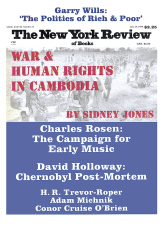In response to:
The Constitution in Danger from the March 1, 1990 issue
To the Editors:
This concerns Theodore Draper’s article [“The Constitution in Danger,” NYR, March 1] and the ensuing correspondence with Lawrence Block and David Rivkin [NYR, May 17].
One important aspect of the famous Curtiss Wright case is seldom mentioned in the discussion of executive power in foreign affairs. Justice Sutherland’s opinion consists largely of a discourse on his odd theory that federal power in foreign affairs comes, not from the constitution, but from international law. He then segued from that theme to an assertion that, within the federal government, the foreign affairs power resides in the executive. Both propositions were unnecessary for the decision of the case, and are, as has been often pointed out, personal obiter dicta. Sutherland was riding an old hobby horse: he apparently had imbibed his doctrine at the University of Michigan law school, which he attended in 1882, wrote about it in the North American Review of 1910, and delivered a lecture series on it in 1918.
As participants in the current debate in your pages have mentioned, Sutherland made a sharp distinction between the powers of the federal government internally and externally. Internally, it had only those powers conferred on it by the members states through the Constitution. But in dealings with foreign nations, “since the states severally never possessed international powers, such powers could not have been carved from the mass of state powers but obviously were transmitted to the United States from some other source.” And that source was international law. When “the external power of Great Britain in respect of the colonies ceased, it immediately passed to the Union.”
In Sutherland’s words, “Even before the Declaration, the colonies were a unit in foreign affairs, acting through a common agency—namely, the Continental Congress, composed of delegates from the thirteen colonies.” Accordingly “the investment of the federal government with the powers of external sovereignty did not depend upon the affirmative grants of the Constitution,” but rather those powers “exist as inherently inseparable from the conception of nationality.”
Sutherland cited cases in which the Supreme Court had upheld the federal capacity to do things not explicitly mentioned in the Constitution—to acquire territory by discovery, expel undesirable aliens, enter into executive agreements with other nations. In these cases, he said, the court “found the warrant for its conclusions not in the provisions of the Constitution, but in the law of nations….”
While a nineteenth-century treatise-writer in international law might well have endorsed Sutherland’s elaborate dicta, they would have startled the citizens of the fledgling Union during the years of the Continental Congress and Articles of Confederation. Indeed, it was the difficulties arising from excessive jealousy of individual “sovereign” rights of the member states that led to the formation of a constitutional convention. There the founders would create a central government that did at last have a monopoly of authority to regulate international trade, maintain an army, and enter into agreements with other nations.
And Sutherland’s dicta would have drawn a smile from the rulers of other nations during the War of Independence: both France, in its treaty of amity and commerce with the colonies, and Great Britain, in its treaty of peace at the end of the Revolutionary War, took pains to recognize the sovereign qualities of the “Thirteen United States of America,” which they listed in geographic order from New Hampshire southward to Georgia as parties to the treaties.
Having located the foreign-relations power in the federal government as an extra-constitutional norm, Sutherland then proceeded to assign that power, within the government, to the executive. Again he scarcely referred to the terms of the Constitution but instead discussed the practical necessities of having some designated authority to whom other nations could look to act on behalf of the United States—an authority that could act with dispatch and confidentiality, and armed with timely information. Again, treatise-writers would say that every nation must have an organ that others may regard as speaking authoritatively in international affairs. By the time Sutherland wrote his famous opinion, other governments had learned the hard way that the US president could not always deliver the goods by himself in the American constitutional system.
Lawyers will not settle the debate about the constitutional roles of executive and legislature in foreign affairs. As has often been pointed out, tension between the branches in this field has existed ever since the Constitution came into effect. Both branches have been guilty of excesses and folly in pushing their own claims to authority, but we must hope the tension persists and is not resolved in favor of “exclusive” or “supreme” power for either.
Anyone who follows the debate is familiar with the long list of instances in which a president has acted without congressional authority or bent the law to circumvent the obvious wishes of the legislature. But even FDR, the most frequently cited in this connection, was careful not to get too far ahead of Congressional and public opinion. What sets the Iran-contra affair apart from the many other instances is that it involved a settled course of executive action over a period of years in clear opposition to the will of Congress (and, for whatever it may be worth, to public opinion as expressed through polls), and probably in violation of law.
One of the distressing aspects of the Iran-contra debate is that its partisan political aspects (inevitable in such cases) have obscured the basic question: Does either party really want a constitutional precedent for untrammeled executive authority in foreign affairs, exercised in secrecy and in violation of federal statutes over a period of months or years?
H.C. Merillat
Former Executive Director
American Society of International Law
Washington, DC
This Issue
July 19, 1990



